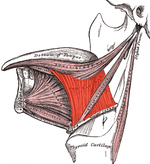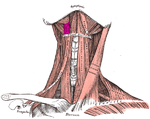The hyoglossus is a thin and quadrilateral extrinsic muscle of the tongue. It originates from the hyoid bone; it inserts onto the side of the tongue. It is innervated by the hypoglossal nerve (cranial nerve XII). It acts to depress and retract the tongue.
| Hyoglossus | |
|---|---|
 Extrinsic muscles of the tongue. Left side. (Hyoglossus visible at center.) | |
 Muscles of the neck. Anterior view. Hyoglossal muscle in purple | |
| Details | |
| Origin | Hyoid |
| Insertion | Side of the tongue |
| Nerve | Hypoglossal (CN XII) |
| Actions | Depresses and retracts the tongue |
| Identifiers | |
| Latin | musculus hyoglossus |
| TA98 | A05.1.04.102 |
| TA2 | 2118 |
| FMA | 46691 |
| Anatomical terms of muscle | |
Structure
editIt forms a part of the floor of submandibular triangle.
Origin
editfrom the side of the body and from the whole length of the greater cornu of the hyoid bone. The fibers arising from the body of the hyoid bone overlap those from the greater cornu.
Insertion
editIts fibres pass almost vertically upward to enter the side of the tongue, inserting between the styloglossus and the inferior longitudinal muscle of the tongue.
Relations
editStructures that are medial/deep to the hyoglossus are the glossopharyngeal nerve (CN IX), the stylohyoid ligament and the lingual artery and lingual vein.
The lingual vein passes medial to the hyoglossus. The lingual artery passes deep to the hyoglossus.
Laterally, in between the hyoglossus muscle and the mylohyoid muscle, lay several important structures (from upper to lower): sublingual gland, submandibular duct, lingual nerve, vena comitans of hypoglossal nerve, and the hypoglossal nerve. Note, posteriorly, the lingual nerve is superior to the submandibular duct and a portion of the submandibular salivary gland protrudes into the space between the hyoglossus and mylohyoid muscles.
Function
editThe hyoglossus depresses and retracts the tongue and makes the dorsum more convex.
Additional images
edit-
Hyoid bone. Anterior surface. Enlarged.
-
Muscles of the neck. Lateral view.
-
The internal carotid and vertebral arteries. Right side.
-
Distribution of the maxillary and mandibular nerves, and the submaxillary ganglion.
-
Hypoglossal nerve, cervical plexus, and their branches.
-
Coronal section of tongue, showing intrinsic muscles.
-
Hyoglossus muscle
References
editThis article incorporates text in the public domain from page 1129 of the 20th edition of Gray's Anatomy (1918)
External links
edit- Anatomy figure: 34:02-09 at Human Anatomy Online, SUNY Downstate Medical Center
- "Anatomy diagram: 25420.000-1". Roche Lexicon - illustrated navigator. Elsevier. Archived from the original on 2013-12-31.
- Diagram Archived 2005-09-09 at the Wayback Machine